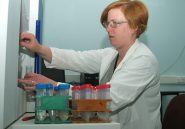Melanie Hannah Registered Scientist
Role: Chemistry Senior Research Technician
Sheffield University
Department of Chemistry
Career Background
 Melanie started as a trainee technician at the department of Chemistry after being made redundant from a technicians post in agricultural feed testing. She had been studying for her degree part time and had just graduated that year. She was terrified as she had never seen an organic lab before, having always worked in analytical chemistry, and was surprised to see students using tap water and buckets.
Melanie started as a trainee technician at the department of Chemistry after being made redundant from a technicians post in agricultural feed testing. She had been studying for her degree part time and had just graduated that year. She was terrified as she had never seen an organic lab before, having always worked in analytical chemistry, and was surprised to see students using tap water and buckets.
That was over 11 years ago and she is now a senior research technician looking after 7 research groups (about 40 PhD students) mostly in the area of Polymer and biomaterials chemistry
Melanie tells us about her journey through registration
Why did you choose to go for registration?
I chose to go for registration as I was hoping to gain recognition for the skills that I have learnt on the job. It is rather hard to quantify or describe a technician’s job and the fact that the Science Council and all the other professional bodies are trying to raise the profile of technicians’ means a lot to me, and I wanted to support the program.
What do you see as the benefits of registration?
The benefits of registration do not only impact on me personally. Of course I feel very proud to be recognised as a professional technician, however it also reflects on the University, the department and the academics that I work for. It shows that they are all committed to ensuring that the technical workforce in their institution are well supported, well trained and the top of their field. It also shows that we are valued members of the university,
What are your key skills and responsibilities?
My key areas of responsibility are the synthetic polymer laboratories and the polymer analytical laboratory. I train the researchers in how to use the instrumentation (mainly GPC and Mass Spectrometry) and how to recognise good data. I ensure the instruments are calibrated and maintain and repair them. In the synthetic lab I maintain all the equipment including a robotic synthesiser that is amazing when and if it works! The most important skill is communication with all sorts of people. I can be presenting results to the professor in charge in the morning and then training a new student in the afternoon, who may not be a native English speaker. Organisation and logic are good skills to have for troubleshooting problems in the analytical laboratory.
What sort of CPD activities you undertake and why?
I have found that a lot of my regular work comes under the remit of CPD. I regularly research papers on the chemistry of the research group for writing protocols and designing experiments. I take advantage of free webinars from manufacturers to keep up to date with the latest technologies. I am always eager to learn new skills and when the opportunity presents itself in the department I am always willing to undergo in house training. For more soft skills training I have made use of the panosphix courses through the Heated website. This type of online training suits me as I work part time and a lot of the more formal training offered by the University is at times that would be awkward for me to attend.
